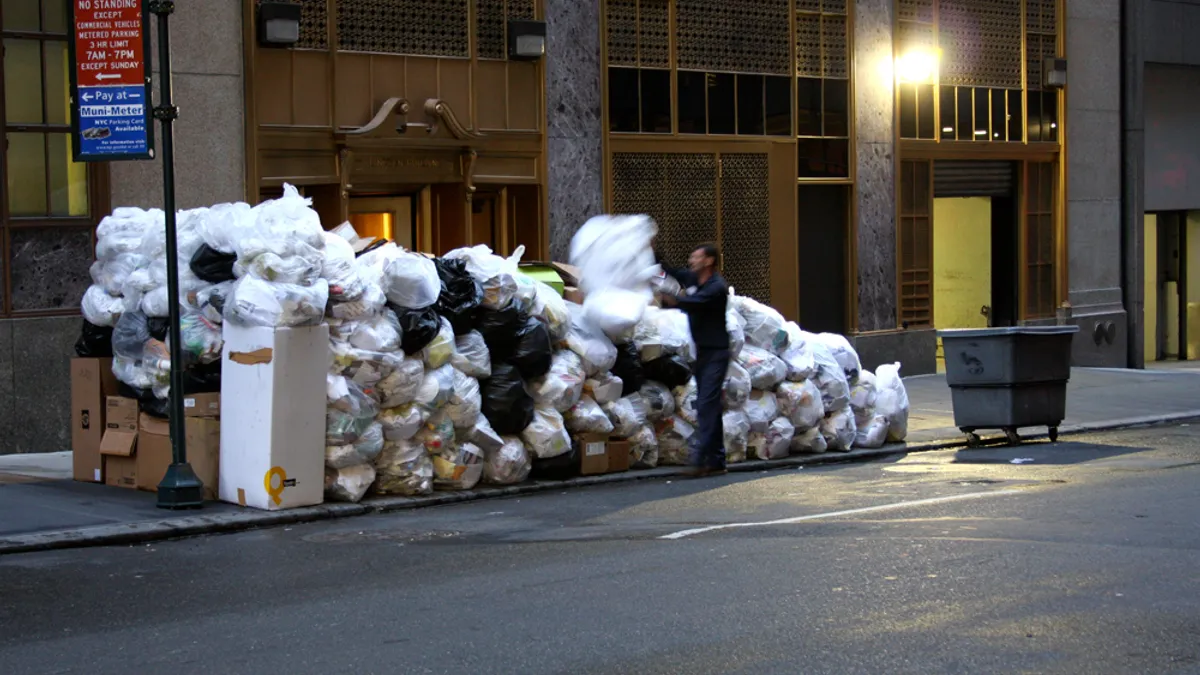Dive Brief:
- The New York legislature recently passed a ban on most expanded polystyrene (EPS) foam products as part of its FY21 budget package. State lawmakers reached a deal on the budget during overtime negotiations earlier this week, with final passage early Friday morning. Gov. Andrew Cuomo signed the budget legislation later that day.
- The budget language targets EPS foodware containers and loose fill packaging. Food trucks, restaurants, delis, caterers and both grocery and retail stores are included, while uncooked eggs, meat, and fish are exempted, as is pre-packaged food sealed prior to delivery.
- New York will join Maine, Vermont, and Maryland, which all have their own forms of EPS bans in place. The statewide EPS ban will take effect by January 2022, with fines for violations beginning at $250, and rising in increments before hitting $2,000 for a fourth violation. Cuomo has touted the ban as a key pillar of his broader environmental agenda.
Dive Insight:
Some states are pausing or rejecting limitations on plastics due to concerns over COVID-19, making New York's ban stand out. The new coronavirus has disrupted state legislative efforts during what had been a record season in many areas for bills targeting plastics. Those pieces of legislation had been gaining momentum in several states, with focuses ranging from single-use plastic bags and straws to EPS containers and recycled content requirements.
Now, New York's EPS restrictions mark a rare step forward for legislation targeting plastics at a time when other efforts have largely come to a halt. New York City already has an EPS ban in place — following a lengthy legal battle — and the new legislation allows that ban to remain in place.
In addition to New York, Washington state has also opted to go forward with its crackdown on plastics. During a shortened session, the state legislature saw an uptick in legislation focused on plastics, with significant support from environmental groups. Gov. Jay Inslee signed SB 5323 — banning single-use plastic bags — on March 25, with the law set to take effect in 2021. Another bill focused on recycled content minimums, HB 2722, has meanwhile passed both legislative bodies and is waiting for Inslee's signature.
Those moves run counter to a growing near-term trend in other states. As the coronavirus pandemic has worsened, state governments have grown concerned about contamination risks. Early-stage research on the virus indicates it can live up to three days on plastics in certain conditions, while little is known about its relationship with textiles. But officials have acted swiftly, with a particular emphasis on plastic bags.
On the state level, Maine has delayed its ban, set to take effect April 22, until next year. Connecticut has lifted its own 10-cent fee, enacted last year. New York has said it will not enforce its statewide plastic bag ban until May 15, due in part to prior litigation.
New Hampshire Gov. Chris Sununu went a step further and imposed a temporary ban on reusable bags by arguing they could spread the virus, an unproven claim. Massachusetts has done the same and also suspended local bag bans.
Other cities and counties have also taken action, with the San Francisco Bay Area becoming the latest to temporarily ban resusable bags this week as a sanitary measure. That ban also extends to reusable mugs, mirroring actions taken by a number of companies like Starbucks, which stopped accepting personal mugs several weeks ago.
Trade groups supporting the plastics industry have pointed to the trend as a sign that bans are premature. The American Chemistry Council (ACC) has argued COVID-19 shows EPS containers, along with other plastics, "can promote safety by reducing risks of foodborne illnesses."
Until recently, the industry has underscored the reusability and recyclability of plastic items. But Tony Radoszewski, CEO for the Plastics Industry Association (PLASTICS), argued in a March 18 letter to the U.S. Department of Health that "single-use plastics are often the safest choice" in the context of the pandemic. "We ask that the department speak out against bans on these products as a public safety risk," Radoszewski wrote.
ACC did not respond to a request for comment from Waste Dive. PLASTICS redirected questions to the American Recyclable Plastic Bag Alliance, which did not respond to a subsequent request by publishing time.
Environmental advocates and anti-plastics groups argue the industry is capitalizing on the pandemic. Judith Enck, former U.S. EPA Regional Administrator and president of Beyond Plastics, praised crackdowns in the midst of the crisis. "[New York and Washington] have demonstrated leadership and remind us all that the facts still matter," she told Waste Dive.
Enck said the industry is imposing "scare tactics" at the expense of the environment and public health. Speaking to New York's EPS ban specifically, she praised the state for its "logical" choice.













